The UK Government today has introduced the UK Tobacco & Vapes Bill 2024.

The bill was first presented by the Conservative government of Rishi Sunak in March 2024. Due to the change of government in the UK General Election, the bill was shelved as there was not the time to progress it before the new government came into place.
However Sir Keir Starmer’s Labour government promised to reintroduce the bill and we were all left wondering what form it would take and what (if any) amendments there would be.
We will examine how this new version of the bill will impact vapers and various responses from consumer organisations, advocates and the vape industry.
Main Points Of The Bill
The main aims of the UK Tobacco & Vapes Bill 2024 according to the Gov.uk website are…
- World-leading reforms introduced to phase out smoking, protecting the public, NHS and economy and put us on track to a smokefree UK
- Government will be given powers to extend indoor smoking ban to certain outdoor settings, focused on protecting children and the most vulnerable, in addition to creating the first smokefree generation
- Bill will also ban vape advertising and sponsorship, as well as create new powers to restrict the flavours, display and packaging of all types of vapes
- Combined with on the spot fines, tougher action on enforcement and tighter regulation on vaping, the Bill will protect children and young people from harm and addiction
The bill is in addition to the upcoming disposable vape ban and vape duty introduction which already have made many vapers feel as though they are being punished for quitting a dangerous tobacco habit!
What Does The Bill Mean For Vapers?
Well it is slightly unclear how this will pan out…
“This sits alongside a ban in the Bill on vape advertising and sponsorship, as well as powers to restrict the flavours, display and packaging of all types of vapes, as well as other nicotine products.”
I found disturbing the fact that vape flavours may be restricted. This is not a proposal to restrict them at present, but this bill will grant the government the power to do this in the future.
Also heavy advertising, displays and packaging restrictions look to be on the horizon.
Other points include:
“The government will also take tougher action to crack down on youth vaping, with 25% of 11 to 15-year-olds having tried vaping in 2023.”
I am not sure how this will be implemented. We already have robust age of sale restrictions. The issue is not the law but the enforcement.
“Subject to consultation, the government is considering extending restrictions in places that are currently smoke free to also become vape free, especially in areas where there are children and young adults.”
This paragraph mentions a consultation on the issue of vape free areas. This is alarming as the wording seems to imply that anywhere that is currently smoke free will also be required to be vape free too.
With all the scaremongering about vaping – this is very damaging. Firstly making vapers stand with smokers is not cool. Many vapers have recently quit smoking and being around smoking could trigger them to go back to the habit. Also it gives out the message that vaping and smoking are equal – despite smoking being far more dangerous to the participant and those around them inhaling second hand smoke.
Chief Medical Officer for England, Professor Chris Whitty, said:
“The rising numbers of children vaping is a major concern and the Tobacco and Vapes Bill will help prevent marketing vapes to children, which is utterly unacceptable.”
“This is a major piece of legislation which if passed will have a positive and lasting impact on the health of the nation.”
Dr Charmaine Griffiths, chief executive at the British Heart Foundation, said:
“We also welcome measures to make vaping less appealing to young people. We know the vast majority of the public back the aims of this Bill, and we urge MPs of all parties to support this life-saving legislation and vision of a smokefree UK.”
Henry Gregg, director of external affairs at Asthma + Lung UK, said:
“If you’re a smoker and you want to quit tobacco, vaping can be a helpful way to give up smoking. But children and those who don’t smoke should not start to vape, especially if you have a lung condition.
Recent figures show a worrying rise in the numbers of children vaping, who mostly use disposable vapes. It’s high time to put a stop to the vaping industry marketing their products towards children with cheap prices and appealing flavour options.
It’s good to see increased powers to regulate vape branding, promotion and flavours in this bill and further powers of enforcement.”
Impact On The Vaping Industry
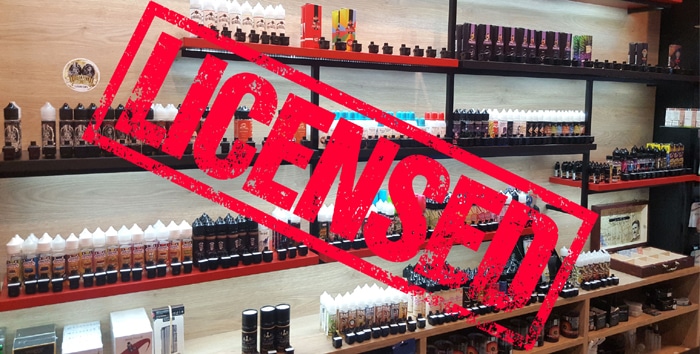 Powers to introduce a licensing scheme for tobacco, vape and nicotine products have been included in this bill.
Powers to introduce a licensing scheme for tobacco, vape and nicotine products have been included in this bill.
We will have to wait for more details of how this will be structured.
How Will The UK Tobacco & Vapes Bill 2024 Be Enforced?
The MHRA e-cigarette and vape products regulator page describes all the departments involved in enforcing the new regulations…
| Agency / Department | Responsibilities |
| Office for Health Improvement and Disparities – Tobacco and related products regulations | Cross-border distance sales responsibilities - manages retail registrations to undertake cross-border distance sale of e-cigarette liquids, devices and components and tobacco products into and out of Northern Ireland. Retailers based in Great Britain, Northern Ireland, the European Union, and other countries must register with the Office for Health Improvement and Disparities |
| Department for Business and Trade (DBT) – Office for Product Safety and Standards (OPSS) | OPSS is the national regulator for consumer product safety (other than in relation to vehicles, medicines, and food), working with local authorities, other market surveillance authorities and border control authorities. |
| Environment Agency – Environment & Business – Producer Responsibility | Companies that place e-cigarettes/vapes on the market in the UK need to register as an electrical and electronic equipment (EEE) producer and a batteries producer. These requirements come from the Waste Electrical and Electronic Equipment (WEEE) Regulations 2013 and the Waste Batteries and Accumulators Regulations 2009, respectively. These companies may also need to register as packaging producers under the Producer Responsibility Obligations (Packaging Waste) Regulations 2007 and the Packaging Waste (Data Reporting) Regulations 2023 (note: there are separate data reporting regulations for England, Wales, Northern Ireland and Scotland). Producers must register so that they can fulfil their legal obligations to finance collection and treatment of these products once they become waste. |
| Natural Resources Wales – Cyfoeth Naturiol Cymru – Producer Responsibility – WEEE | Not specified |
| Health and Safety Executive – Chemicals Regulation Division | CLP – European Regulation (EC) No 1272/2008 on classification, labelling and packaging of substances and mixtures. This regulation was replicated in the UK with the changes needed to make it operable in a domestic context and is now known as GB CLP. Anyone who supplies chemical substances or mixtures which are classified as hazardous needs to classify and label those products appropriately. Chemical classification – HSE. REACH – European Regulation (EC) No 1907/2006 concerning the Registration, Evaluation, Authorisation and Restriction of Chemicals. |
| Trading Standards – Local Enforcement | Tobacco and Related Product Regulations 2016 – The Tobacco and Related Products Regulations 2016 (legislation.gov.uk). Nicotine Inhaling Products (Age of Sale and Proxy Purchasing) Regulations 2015 – The Nicotine Inhaling Products (Age of Sale and Proxy Purchasing) Regulations 2015 (legislation.gov.uk). Some parts of the classification, labelling and packaging of chemicals regulations where they relate to retail sales – The Classification, Labelling and Packaging of Chemicals (Amendments to Secondary Legislation) Regulations 2015. |
| Northern Ireland Environment Agency (NIEA) – Producer Responsibility | Not specified |
| Scottish Environment Protection Agency (SEPA) – Producer Responsibility | Not specified |
| Department for Environment, Food & Rural Affairs (Defra) – Resources and Waste | Defra is responsible for the delivery of the waste prevention programme Maximising Resources, Minimising Waste, which includes waste electrical and electronic equipment (WEEE) and disposable vapes. The sale and supply of disposable vapes are to be banned in England, Scotland and Wales. The proposed ban follows a UK Government consultation on Creating a smokefree generation and tackling youth vaping published in October 2023. The government response to the consultation was published in January 2024. Enforcement of the disposables ban will be carried out through Trading Standards officers using civil and criminal sanctions. |
My Thoughts
Flavours
Sadly the UK Tobacco & Vapes Bill 2024 – despite being vague – potentially could impact flavours and the freedom to vape.
The government will be giving itself the power to restrict flavours – even if not immediately acted upon, it does mean this is an option. With the bad press and public outrage towards vaping, I believe flavour restrictions will be coming in the near future. I really hope I am wrong.
Of course as all vapers know, flavours are a huge part of the experience. Personally I have found very few tobacco flavour (yes tobacco is also a flavour) e-liquids which I actually enjoyed. When I first started vaping back in 2013 there were only Menthol or Tobacco flavours to choose from. I detested both, sold my vape kit and gave up the idea of vaping and went back to smoking.
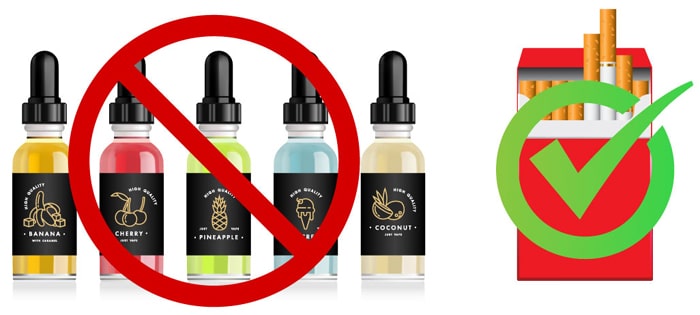
But flavours apparently are what are attracting young people to vape. Years ago they would have picked up a revolting tasting cigarette instead. That did not stop them smoking?
How many people will either return to smoking or source illicit supplies if flavours are heavily restricted? I have no idea how I will cope with that.
Public Image Of Vaping
Banning vaping in smoke free areas reinforces the poor public image of vaping. For some members of the public, these measures may mean that people equate to smoking with vaping in terms of risk.
Back in August 2023, ASH (Action on Smoking & Health) reported that they found 4 in 10 smokers wrongly believed vaping was as harmful or more harmful than smoking! The tobacco and vapes bill will keep this misperception thriving and deter people switching from smoking to vaping.
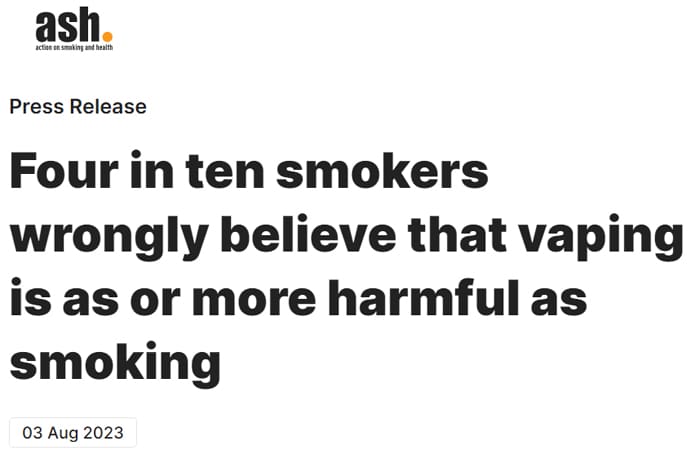
Whilst I have no issue what packaging my vape arrives in, plain packaging could again send a negative message that smoking and vaping are both dangerous.
As you read earlier in this article, some of the “experts” quoted on the gov.uk website seem to be ignorant to the fact that far more adults vape to escape tobacco smoking.
It is hard to comprehend how the UK government have travelled from their positive Swap To Stop campaign announced in April 2023 to the punishing of vapers with taxes, disposable bans and now this new bill.
The Khan Review in June 2022 was very positive towards vaping as a means to cut down the UK smoking rates. It appears the government have taken little notice of the findings.
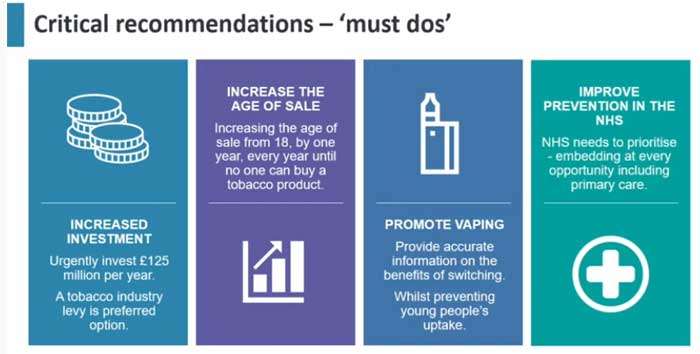
Brunel University conducted a study and the results published in August 2023 stated that the “NHS would save more than £500m a year if half of England’s adult smokers vaped instead“.
Under Age Vaping
As for preventing under age vaping – ASH published their vaping data survey results in August 2024 which showed that youth vaping rates have stabilised and even reduced in some categories.
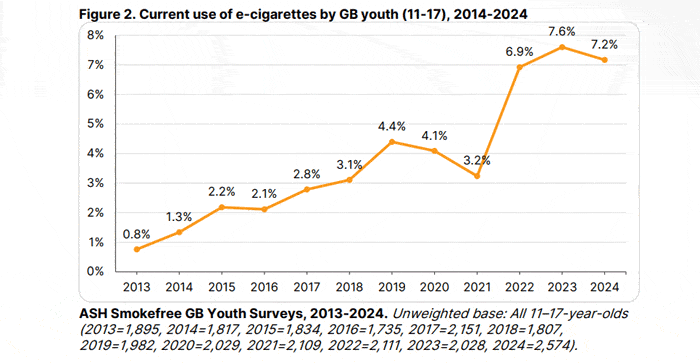
Another fact sheet from ASH stated that youth smoking rates have declined heavily. In 2000 the number of current smokers aged 16 and under was 19%. By 2018 this had dropped to 5%. This dropped further to 3% in 2021. So this does show that young people have taken up vaping but they have also been avoiding tobacco.
Enforcement
A licensing system I do believe will be helpful in trying to tackle the huge illicit market and those flogging vapes to under age people. Also any funds raised from the system could be used to better enforce the regulations.
It has been reported how underfunded and under-resourced Trading Standards (the agency who are responsible for the regulation) are. Very few prosecutions for under age sales actually materialise and the fine structures are low.
The UKVIA launched their “Be Vape Vigilant” campaign in late 2023 to encourage reporting of rogue traders engaged in under age or illicit vape sales. Over 100 people reported retailers and 47% of reports related to illegal or illicit products and 18% reported under age sales. The results also highlighted how 2 of the rogue sellers had previously been reported to Trading Standards but were continuing with sales.
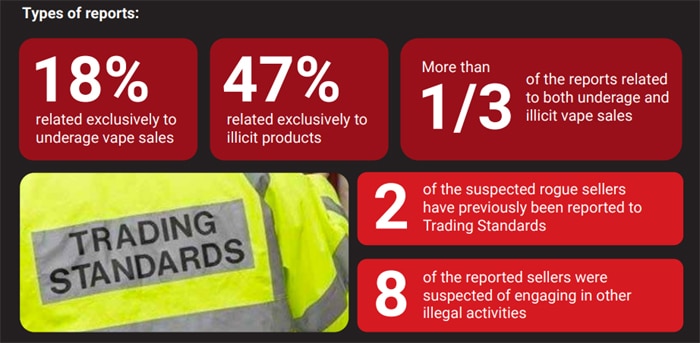
We have strict rules (TPD) on the contents of vapes. The e-liquid capacity and nicotine strengths are capped. Sadly illicit sales of devices and e-liquid exceeding these restrictions are – as We Vape found – extremely common – this is before further regulation and bans. If people are unable to obtain what they need legally at a price they can afford they will turn to illicit and “Black Markets”.
Illicit sales will not adhere to age restrictions or TPD laws and dangerous devices with poor electrical or chemical safety could be getting into the hands of the public and children.
I guess it will just be a case of “Wait and see” to establish how heavily vaping will be restricted.
Responses
I will update this section as more responses are published.
Please also let us know your thoughts in the comments below!
IBVTA
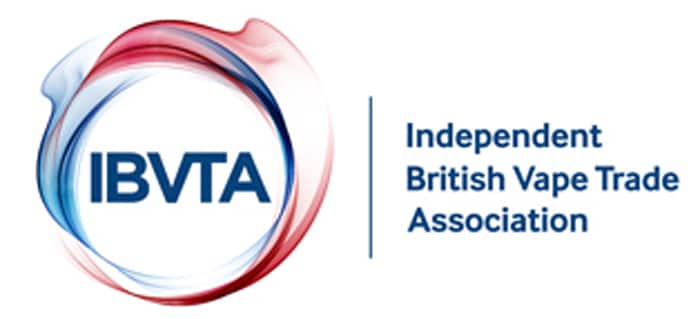
Press Release
Vape industry reacts to Tobacco & Vapes Bill.
The Independent British Vape Trade Association (IBVTA), the leading independent trade association for the UK vaping industry, says there are measures to be welcomed within the Tobacco and Vapes Bill. However, it reiterates the need to balance restricting access of vaping to young people with ensuring adults who smoke can access the most popular and effective tool for quitting.
The Bill introduced in Parliament today (5th November) comes after separate legislation that will ban single use vapes from June next year. A further announcement that liquid used in refillable vapes and prefilled pods will be subject to a duty of £2.20 per 10ml came in the Autumn Budget last week.
As well as banning the sale of tobacco products to anyone aged 15 or younger this year, the Tobacco and Vapes Bill carries over other elements of similar plans from the last Conservative government. The previous Bill ran out of time and fell before the general election.
This sits alongside a ban in the new Bill on vape advertising and sponsorship, as well as powers to restrict the flavours, display and packaging of all types of vapes, as well as other nicotine products.
Additional new measures from the Labour government include powers to extend the indoor smoking ban to specific outdoor spaces: with children’s playgrounds, outside schools and hospitals all being considered, subject to consultation. Wes Streeting is also considering including vaping within the smoking ban in some indoor spaces.
The Bill will also include powers to introduce a licensing scheme for retailers to sell tobacco, vape and nicotine products in England, Wales and Northern Ireland, and will introduce on the spot fines of £200 to retailers found to be selling these products to people underage.
Chair of the Independent British Vape Trade Association, Marcus Saxton, said:
“There are things to be welcomed in this Bill, such as strengthened powers of enforcement against retailers who engage in illegal sales. However, there is also a danger that with so many legislative avenues being sought to reduce youth uptake of vaping, ‘regulatory overkill’ may hamper the future of vaping as the UK’s leading quit aid for adults.
“The IBVTA looks forward to working positively and progressively with the Government to ensure that vaping becomes less accessible and desirable to children, and to adults that would not otherwise be smoking. However, this can only be considered successful in the context of continuing the decline in adult smoking rates that has accompanied the growth of the UK’s vape sector.
“Excessive restrictions on the types of products that our members can provide may reduce the products’ appeal. Even worse, they may contribute to continued misperceptions about the harm of vaping relative to tobacco smoking. Specifically, the role of flavours in supporting adult smokers to a successful quit attempt is accepted and understood by most public health stakeholders, and we believe to have been fundamental to the success of vaping in reducing smoking rates. Therefore, any reference to potential powers to restrict flavours is very worrying, as it threatens the government’s own goal of the UK becoming smoke free by 2030.
“It is vital that more smokers understand that switching to vaping is of much lower harm, and can help them to quit smoking for good.”
UKVIA
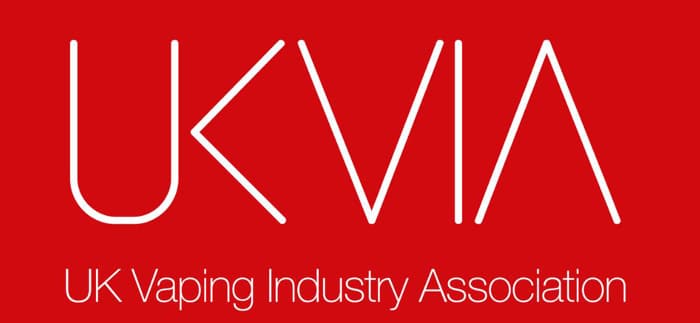 Press Release
Press Release
The UK Vaping Industry Association (UKVIA) has welcomed the news that the Government has included powers to introduce a licensing scheme for retailers to sell tobacco, vape and nicotine products in England, Wales and Northern Ireland. It says:
“This represents a victory for law abiding vape businesses who have been campaigning for years for such regulation to stop rogue traders in their tracks from selling to minors and establishing a lucrative black market.”
UKVIA Director General John Dunne said:
“We have been consistently calling on successive governments to introduce a robust and effective industry licensing scheme, backed up by fines of at least £10,000 for retailers and £100,000 for distributors who trade illegally when it comes to underage and illicit vape sales. The scheme we have developed and recommended is designed to generate upwards of £50m per year to support a highly resourced national Trading Standards enforcement programme.
“It is not clear whether the government will include vape distributors in their plans, but we are clear that any scheme must do so to be successful. The fines of £200 announced need to be much higher if they are going to make rogue traders think twice about breaking the law.
“However, I am delighted that vape licensing is now firmly on the policy agenda, so that youth and illicit vaping can successfully be tackled and the complete focus of the category can once more return to helping adult smokers quit. We stand ready to work closely with the government to ensure such a scheme is fit for purpose.”
Earlier this year the vaping industry unveiled a framework for a licensing scheme following extensive consultation with leading figures representing the retail industry, trade bodies, regulators and consumer groups.
Currently, no system exists for the vaping industry in the UK meaning that in addition to specialist vape stores, convenience shops and supermarkets, anyone has free rein to sell vapes including off licences, takeaways and sweet shops. It also means those retailers and distributors who wrongfully sell vapes to minors and stock illicit goods can more easily stay under the radar of regulators and Trading Standards.
As regards the creation of new government powers to restrict flavours, display and packaging of all types of vapes, Dunne added:
“We will want to understand the detail of these powers as it is imperative that the new government establishes a balanced approach to vaping policy which safeguards against the very real challenges of youth vaping and illicit products, while preserving and promoting vaping as the most successful stop smoking tool available for adults.
“In particular, the government needs to take on board the critical role that flavours play in the appeal and success of vaping as a harm reduction tool. Therefore, there is a need to put the focus on restricting inappropriate flavour names, not flavours.
Dunne concluded: “We believe that the best way to address youth vaping and the black market, and not penalise adult smokers who want to quit using vapes is through a licensing scheme.”
See DHSC press release: Smoking ban introduced to protect children and most vulnerable.
Social Media Responses
The proposals in the Tobacco & Vapes Bill are more likely to delay #Smokefree2030 than accelerate it @guardiannews @CRUK_Policy pic.twitter.com/qwxkgsEuQq
— Geoff Vann (@BV_dodderer) November 4, 2024
tl;dr #KeepSmokingWeNeedTheMoneyhttps://t.co/s46EFYvWra
— Phil (@phil_w888) November 4, 2024
The post UK Tobacco & Vapes Bill 2024 Introduced + Industry, Consumer & Advocate Responses appeared first on Ecigclick.








